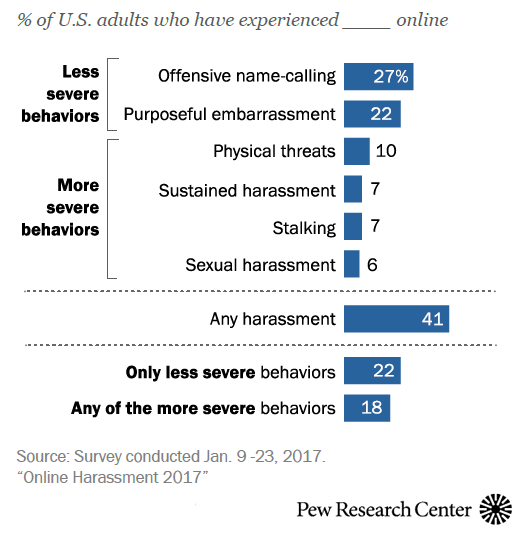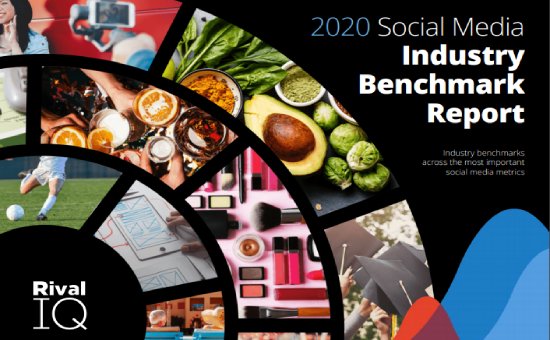Online Harassment 2017 | Pew Research Center
Consumer Behavior | USA
“Online Harassment” or “Cyber Stalking” is defined as repeated online expression amounting to a “course of conduct” targeted at a particular person causing him/her a fear for the substantial emotional distress and/or the fear of bodily harm.
Figure out what American internet users said about being victims of online harassment:
Overview of Online Harassment in the US
- 94% of American adults are aware of this issue, and one-third have heard a lot about it and 62% consider online harassment as a major problem.
- 41% reported that they have personally experienced online harassment, with 66% has witnessed these behaviors directed at others.
- Offensive name-calling is the most form of online harassment Americans face (27%), followed by 22% for purposeful embarrassment and then 10% for physical threats.
- Social media is the most common platform for online harassment experiences (58%), followed by comments section (23%) and messaging apps (15%).
- As a result of that, 27% said they decided not to post something online after witnessing the harassment of others, while 13% said they stopped using an online service after witnessing other users engage in harassing behaviors.
- 79% hope there is a decisive action when harassment occurs on their platforms and 35% want better policies and tools from online companies.
- Political views (14%), physical appearance (9%), gender (8%) and race (8%) are among the top reasons people say they are harassed online.
- Younger adults (18-30 years) especially likely to encounter severe forms of online harassment such as offensive name-calling (46%), purposeful embarrassment (37%) and physical threats (25%).
Experiences & Attitudes Toward Online Harassment
- 44% of men and 37% of women have experienced at least one of online harassment behaviors.
- 44% claimed that their most recent online harassment experience caused mental or emotional stress, 44% claimed they found the incident “extremely” or “very” upsetting and 29% felt their physical safety (or the physical safety of those close to them) was at risk.
- 63% of those who have ever been targeted with severe behaviors claimed they took action to intervene when they saw someone else harassed online.
- 9% said they have experienced mental or emotional stress because of something untrue posted about them online.
- As a result of that, 26% of all adults have had untrue information about them posted online, most commonly about their character or reputation (17%).

A Graph Shows the Percentages of Adults Who Have Experienced Online harassment in US, 2017
Methodology:
Data were driven from 4.248 American respondents aged 18-65 and older; including 4.165 internet users.

Pew Research Center
Market Research
Pew Research Center was a research project founded in 1990 by the Times Mirror newspaper company and called the Times Mirror Center for the People & the Press. The project conducted regular polls on politics and major policy issues. Today, Pew Research Center is a nonpartisan fact tank that informs the public about the issues, attitudes, and trends shaping the world.Pew Research Center conducts public opinion polling, demographic research, content analysis and other data-driven social science research. The center studies U.S. politics and policy; journalism and media; internet, science and technology; religion and public life; Hispanic trends; global attitudes and trends; and the U.S. social and demographic trends.






